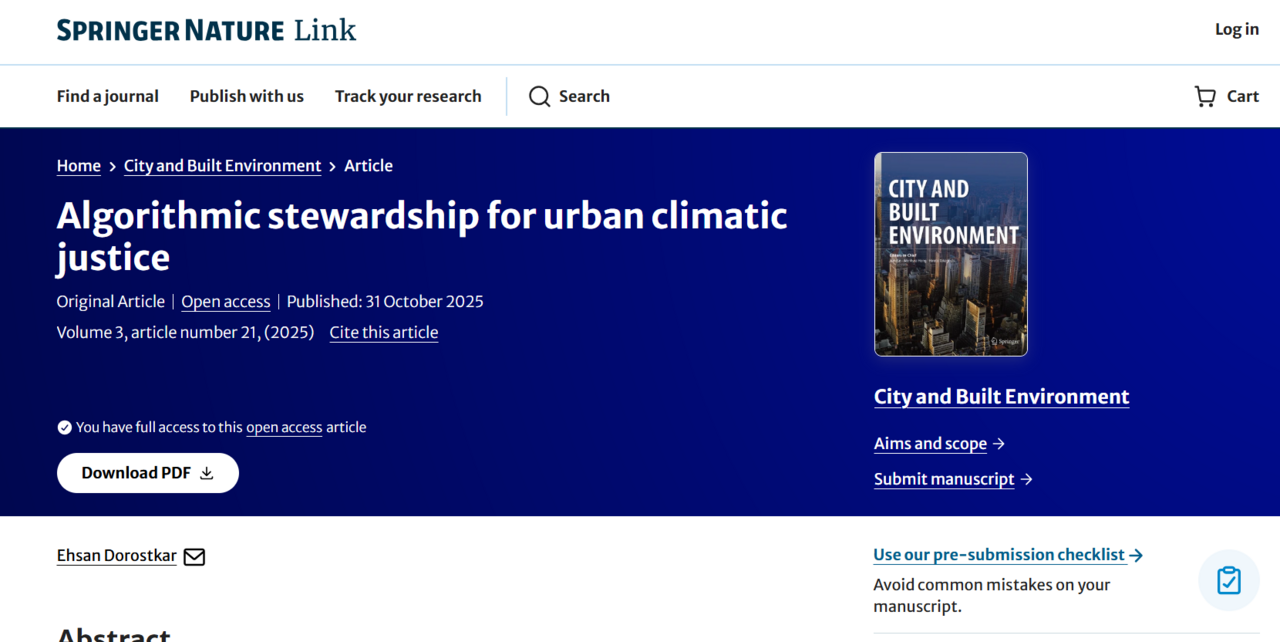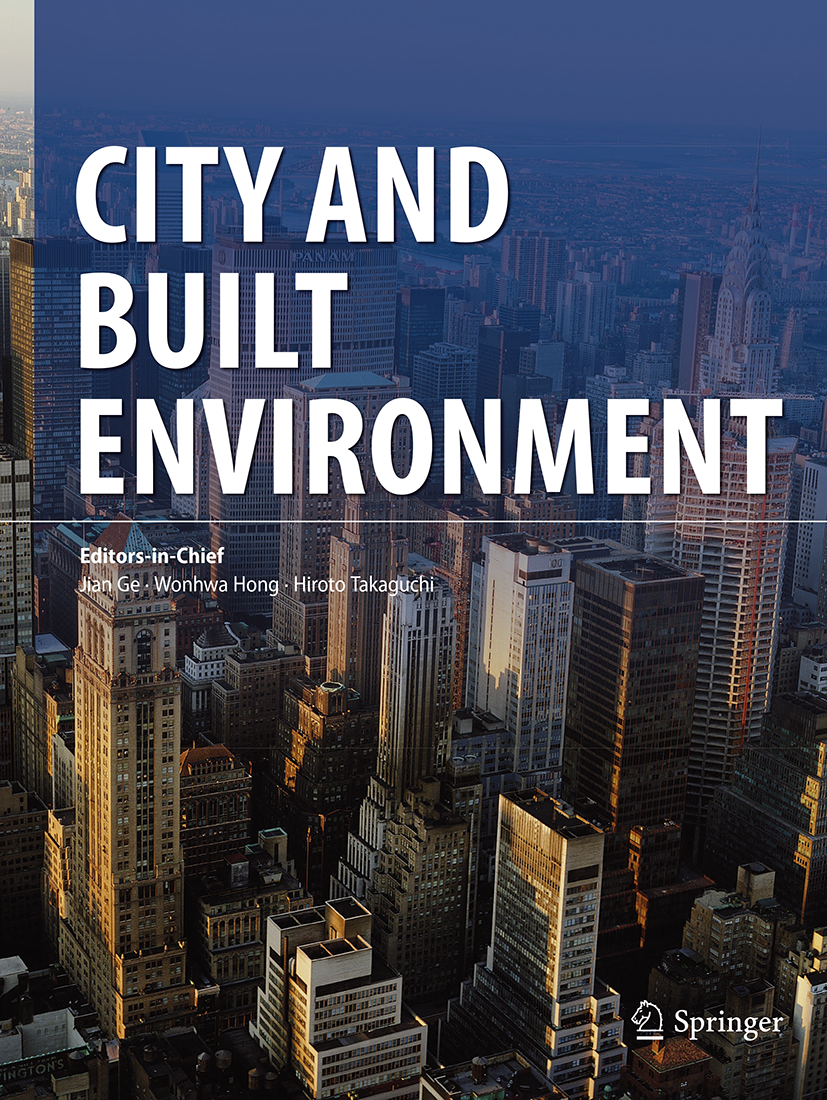From Algorithmic Control to Stewardship: A New Framework for Urban Climatic Justice
Published in Earth & Environment

In an era of climate collapse and rapid urbanization, cities are increasingly turning to artificial intelligence (AI) to manage complex challenges. From optimizing traffic flow to rationing water, algorithms are becoming central to urban governance. But what happens when these "smart" systems, often praised for their efficiency, end up deepening existing social and spatial inequalities?
In my recent article, "Algorithmic Stewardship for Urban Climatic Justice," published in City and Built Environment, I argue that the current technocratic approach to "smart cities" is inadequate. Instead, we need a transformative shift towards algorithmic stewardship—a framework that retools urban AI to serve climatic justice rather than prioritise efficiency fetishism.
The Problem: When "Smart" Cities Make Inequality Smarter
Using Tehran as a pivotal case study, the paper reveals how algorithms, despite their technical elegance, can weaponize optimization:
-
Heat-Vulnerability Maps that equate adaptive capacity with property values, effectively erasing the sophisticated thermal knowledge of informal settlements.
-
Water Rationing Algorithms that prioritize supply to high-revenue industrial zones, systematically dehydrating peripheral communities and encoding "hydrological apartheid."
-
Disaster-Response Systems that triage human lives, valuing high-rise commercial districts over informal settlements in flood scenarios—a process I term computational necropolitics.
These aren't mere technical failures; they are design features of systems that optimize within unjust frameworks rather than challenging them.
The Solution: The Three Pillars of Algorithmic Stewardship
Algorithmic stewardship proposes a radical reconfiguration of urban AI, built on three core principles:
-
Generative Transparency: Moving beyond "explainable AI" to make the value judgments within algorithms legible to the public. For example, an air-quality algorithm should not just report an index but reveal which industrial sectors are being sacrificed in cost-benefit calculations, turning a black box into a site for public deliberation.
-
Systemic Accountability: Hardcoding ethics into the system's logic. This means algorithms must be designed with built-in checks for intergenerational equity, ensuring that solutions to today's water crisis don't sacrifice aquifer health for 2070. Accountability means an algorithm must ask itself: "Will this decision displace low-income families? Does it account for the thermal wisdom of street vendors?"
-
Deliberative Polycentrism: Distributing power away from centralized tech hubs. Instead of the city's innovation center having sole control, stewardship advocates for community data cooperatives where local knowledge—like traditional water-sharing patterns—can shape climate models, creating friction against one-size-fits-all techno-solutionism.
Operationalizing Justice: From Principles to Practice
How do we bring this to life? The paper proposes concrete "institutional counter-architectures":
-
Algorithmic Courts of Equity: Public forums where citizens can formally challenge biased climate algorithms and demand their redesign.
-
Ecological APIs: Open data infrastructures that integrate community-generated knowledge, like the toxicity diaries of asthma patients or the dust-storm calendars of local herders, into official city models.
-
Democratic Immunity Zones: Protecting areas of urban life from computational incursion, such as cultural practices around traditional wind-catchers (badgirs) or local assembly control during crises.
A Path Forward
The transition to algorithmic stewardship demands a new research and action agenda focused on:
-
Epistemic Resistance: Valuing subaltern climate knowledges and creating "epistemic asylum zones" in AI training data.
-
Planetary Algorithmic Literacy: Equipping citizens to question computational decisions that affect their survival.
-
Post-Anthropocentric Custodianship: Granting legal representation and rights to non-human entities, like watersheds and tree canopies, in governance frameworks.
Conclusion
The choice is stark. We can continue down the path of computational authoritarianism, where climate adaptation becomes a vehicle for enforcing privilege. Or, we can embrace algorithmic stewardship to ensure that urban AI is a platform for repair and justice. For Tehran, and for all cities facing the climate crucible, this is not an intellectual abstraction—it is a survivability imperative. The future of our cities will be defined by algorithms; stewardship is our chance to ensure those futures remain human.
Read the full research article for free:
Dorostkar, E. Algorithmic stewardship for urban climatic justice. City Built Environ 3, 21 (2025). https://doi.org/10.1007/s44213-025-00065-4
Follow the Topic
-
City and Built Environment

This journal focuses on newer fields related to various forms of urbanization and development, which resolves those related challenges from a world view perspective.
Related Collections
With Collections, you can get published faster and increase your visibility.
Building Sustainable Cities: Policy, Planning, and Governance
The rapid urbanization of the 21st century presents both challenges and opportunities for creating sustainable cities. As populations grow and climate change intensifies, the need for effective policy, planning, and governance becomes increasingly critical. This Collection aims to explore innovative approaches to urban development that prioritize sustainability, resilience, and inclusivity. By examining the interplay between infrastructure planning, adaptive management, and community engagement, we seek to highlight best practices and lessons learned from various global contexts.
Advancing our collective understanding of sustainable urban development is essential for addressing the pressing issues of climate change, social equity, and economic viability. Recent advances in this field have included the integration of sustainability principles into urban planning frameworks, the adoption of green infrastructure, and the implementation of participatory governance models. These developments have demonstrated the potential for cities to become more resilient and adaptive, fostering environments that support both human and ecological well-being.
Looking ahead, continued research in this area may lead to groundbreaking innovations in urban design and governance. Future studies could explore the role of technology in enhancing sustainability, the potential for circular economy principles in urban settings, and the importance of fostering community-led initiatives. By building on existing knowledge, we can create a roadmap for cities that not only withstand the challenges of climate change but thrive in a sustainable future.
- Climate change adaptation strategies in urban planning, - Governance approaches for sustainable development, - Infrastructure planning for resilient cities, - The role of open space in urban sustainability, - Policy implementation for sustainable urban growth
This Collection will address United Nations Sustainable Development Goal 11: Sustainable Cities & Communities.
Publishing Model: Open Access
Deadline: Feb 28, 2026
Smart Cities: Urban Mobility and Transportation Innovations
The concept of smart cities is rapidly gaining traction as urban areas face increasing pressures from population growth, environmental sustainability, and the need for efficient transportation systems. Urban mobility and transportation innovations play a pivotal role in shaping the future of our cities, integrating advanced technologies to enhance the movement of people and goods. This Collection aims to explore the various dimensions of urban transport, including the adoption of smart technologies, the evolution of commuting patterns, and the impact of innovative transportation planning on urban economies and communities. Understanding the dynamics of urban mobility is essential as cities strive to become more sustainable and livable. Recent advances in technology, such as electric and autonomous vehicles, smart public transport systems, and integrated mobility platforms, are transforming how we navigate urban environments. These innovations not only aim to reduce congestion and emissions but also enhance accessibility and equity in transportation. As cities adopt these technologies, it becomes increasingly important to assess their impacts on travel behavior and urban economies.
Continued research in this area holds promise for groundbreaking advancements that could redefine urban transport systems. Future developments may include fully integrated mobility solutions that leverage real-time data to optimize transportation networks, fostering seamless connectivity across diverse modes of travel. Additionally, ongoing innovations in public transport and urban design could lead to more sustainable commuting practices and improved quality of life for urban residents.
Topics of interest include, but are not limited to:
• Sustainable urban transport solutions
• Technology adoption in public transport
• Impact of smart infrastructure on mobility
• Integration of electric vehicles in urban planning
• Innovations in transportation planning
• Mobility and urban economy interactions
• Policy and governance of smart urban transportation
This collection supports and amplifies research related to SDG 9 (Industry, Innovation and Infrastructure) and SDG 11 (Sustainable Cities and Communities).
Publishing Model: Open Access
Deadline: May 15, 2026






Please sign in or register for FREE
If you are a registered user on Research Communities by Springer Nature, please sign in